Yep, that's a big head. But there's a method to the Franken-headed madness – the cartoonishly massive roof on the new Vanyx camper van is a habitat in itself, splitting the van into separate floors for sleeping and daytime living. The new all-German camper looks to bring an unprecedented level of land yacht luxury to the Class B segment while still offering enough hard-nosed grit and self-sufficient supply to handle extended treks off road and grid. Ingenious creation or proof the overland-glamping market has finally pushed its luck too far?
"Off-road outside, luxury inside" is the simple dichotomy that Vanyx's Ringsheim-based parent company Smart Adventure GmbH is hoping will inspire folks to spend close to a million dollars on a camper van. We've never previously seen a camper van with that kind of price tag, usually reserved for massive, amenity-stuffed expedition trucks, live-in supercar-carriers and design-project-like highway yachts.
The first part of the two-way Vanyx formula begins with a MAN TGE 180 4x4 base van. At 236 in (599 cm) long, it's not even that large of a van compared to the really stretched extra-long MAN campers already roaming road and trail for a fraction of the Vanyx price. The shorter, more manageable length should add to the Vanyx's off-road appeal but not necessarily its luxurious interior.
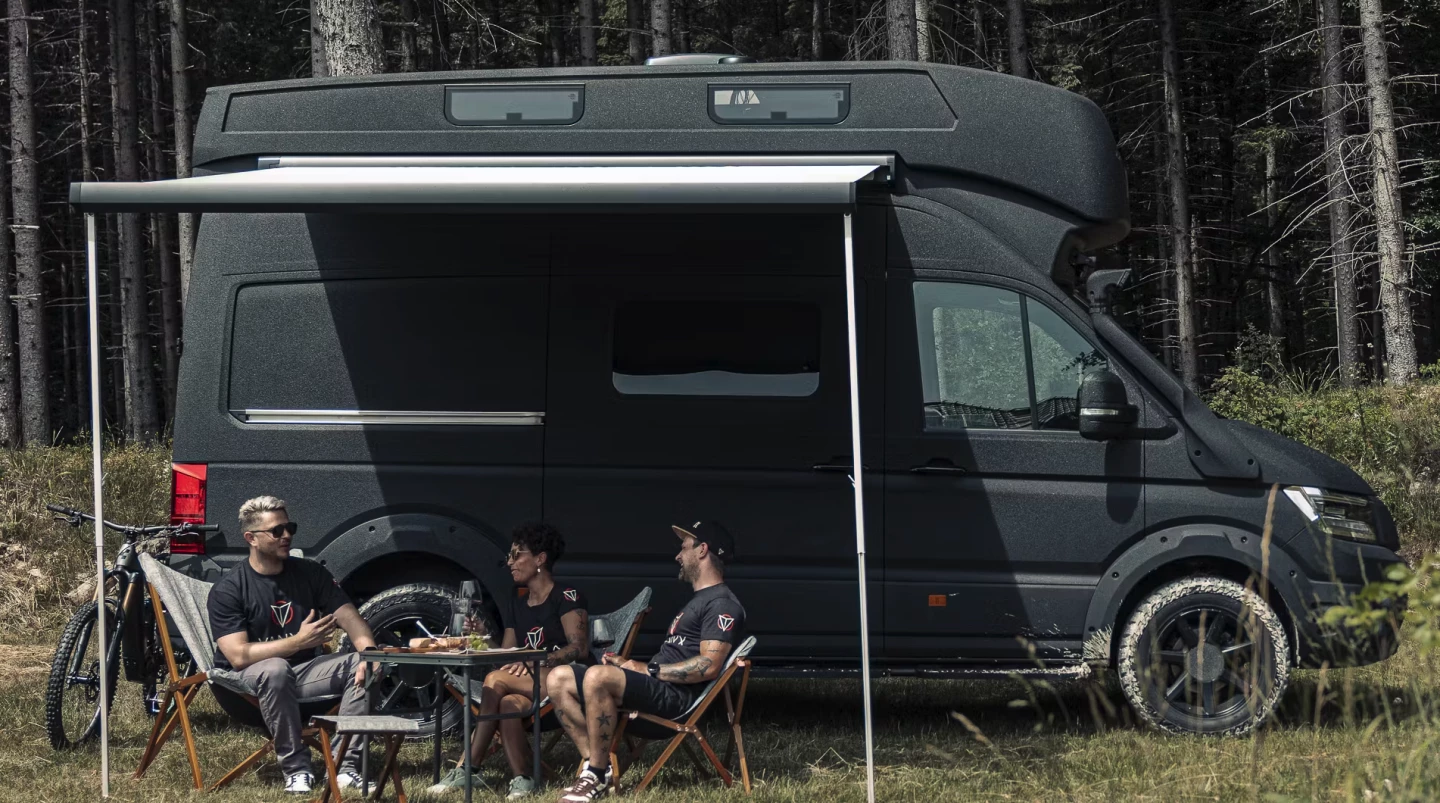
Helping the tuned-up 250-hp engine distribute power out to the grippiest of the four tires is a differential lock. Smart Adventure further upgrades the base chassis with a four-wheel air suspension that delivers up to 6 in (15 cm) of height adjustment for better off-road ground clearance and a lower (i.e. as-low-as-possible-with-that-giant-roof) on-road stance, plus automatic leveling. Drivers can adjust that suspension directly from the Vanyx smart control touchscreen.
As difficult as that giant hard hat is to forgive from both an aesthetics and center-of-gravity point of view, the penthouse chambers earn their place when it comes to the luxurious interior side of the equation. The purpose behind the oversized carbon fiber-sandwich roof, developed in partnership with Germany's famed Fraunhofer Institute, is to house two double beds, one in front and one at the rear. The front bed stretches close to queen size at 79 x 54 in (200 x 138 cm), while the rear bed comes in just a touch shorter at 77 x 54 in (195 x 138 cm).
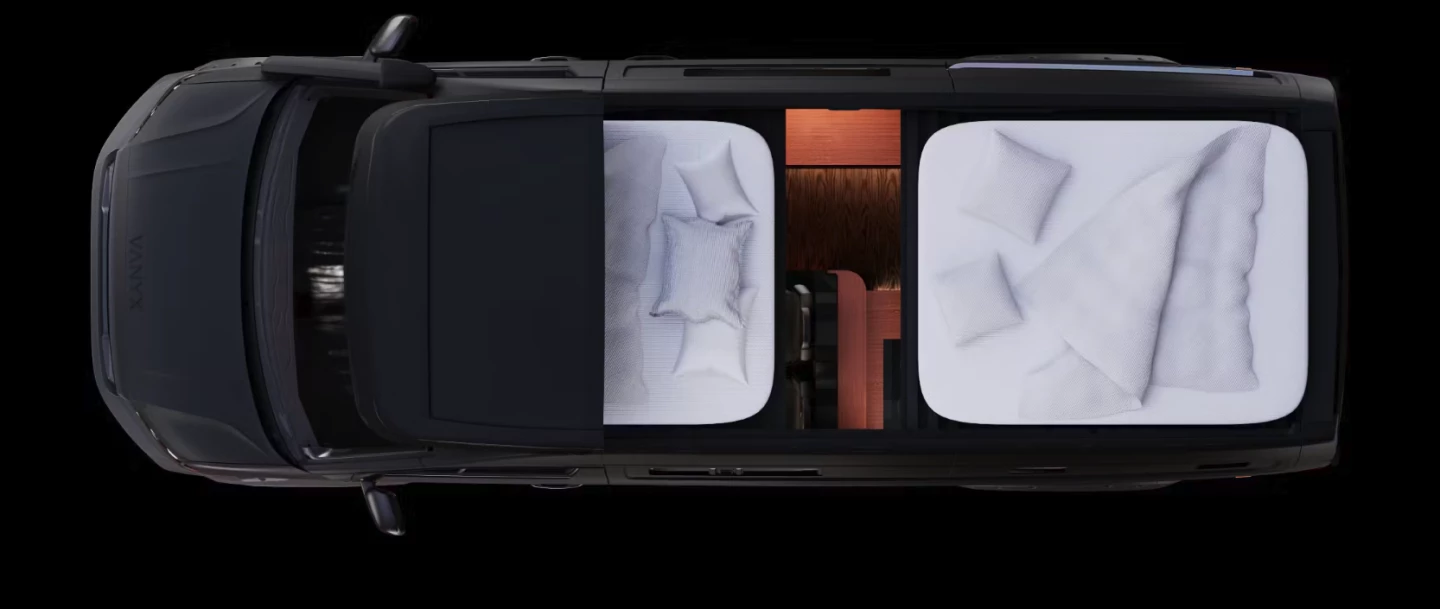
The dual-roof-bed layout stands in contrast to the average pop-up or hard-wall camper van sleeper roof, which houses a single bed, either as the only bed in a two-sleeper camper or as the second bed of a four-sleeper.
We're surprised Smart Adventure chose such an off-road/off-grid-focused camper for debuting its double-bed sleeper roof. The feature, and ensuing price tag, seems better-suited to a luxurious pavement cruiser built for hopping high-priced glamping resorts and motorhome paddocks at exclusive events. When off-roading, that towering roof is all but guaranteed to bulldoze through tree branches, catch some heavy canyon crosswind and/or initiate unwanted gravitational pull when slow-rolling over uneven terrain.
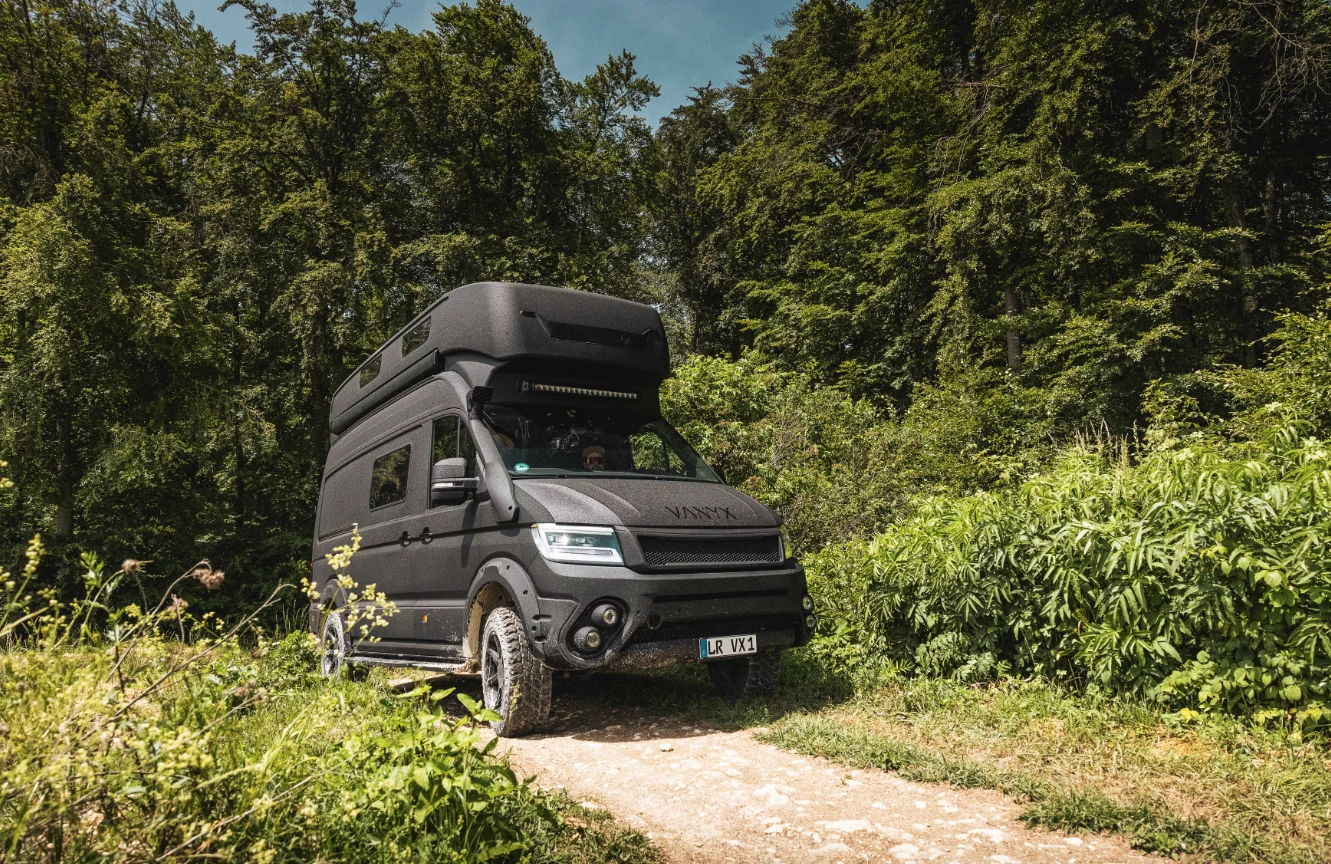
That said, the Vanyx dual-zone strategy has some clear advantages, creating a more residential-like living space that requires no conversion between day and night modes. Enjoy the evening downstairs before retiring upstairs to bed, no need to transform a dinette or bench into your bed. The bed platforms do lift to increase headroom below, but that's a lightning-quick adjustment from day to night.
Sadly, the Vanyx design team has really underutilized the extra ground-level space, in our opinion. If you're going to make a dedicated non-bedroom lower level, it should be one campers will want to spend time in, emphasizing spaciousness and comfort. But instead of the roomy lounge (or two) you'd actually want to sit in for more than a 30-minute meal, Smart Adventure sticks with the underwhelming, cramped front dinette seen in so many other European camper vans.
Smart Adventure does improve the space with an expandable table that slides its way nearly to the opposite side wall, but we still can't imagine enjoying sitting on that upright two-seat bench for very long. And then there's the throw-in worktop console across the way, space that could have been better used for a loveseat or entertainment center.
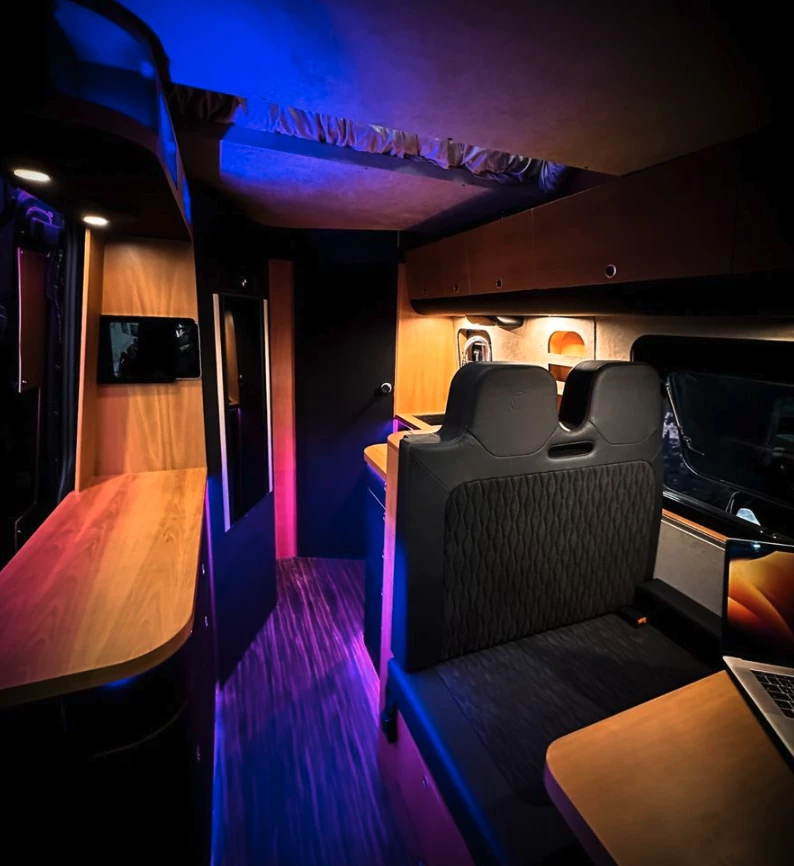
But we suppose anyone spending this kind of money on a camper van will be more interested in whiling away their days at the country club or aboard the yacht and evenings eating at exclusive restaurants, maybe enjoying the occasional private chef-prepped multi-course on their designer one-of-one outdoor glamping furniture.
Even the bathroom, arguably the Vanyx's most unique and luxurious area, feels just a touch underdeveloped. Instead of using the van's extra floor space for a full-width dry bathroom, Smart Adventure sticks with a wet bathroom. It does enhance the space with a rainfall shower accompanied by a unique mood lighting system integrated into the genuine-stone walls, along with a dry separating toilet made out of carbon fiber, but it could have more substantively improved the space with a dry layout of closed shower and separate sink/toilet area.
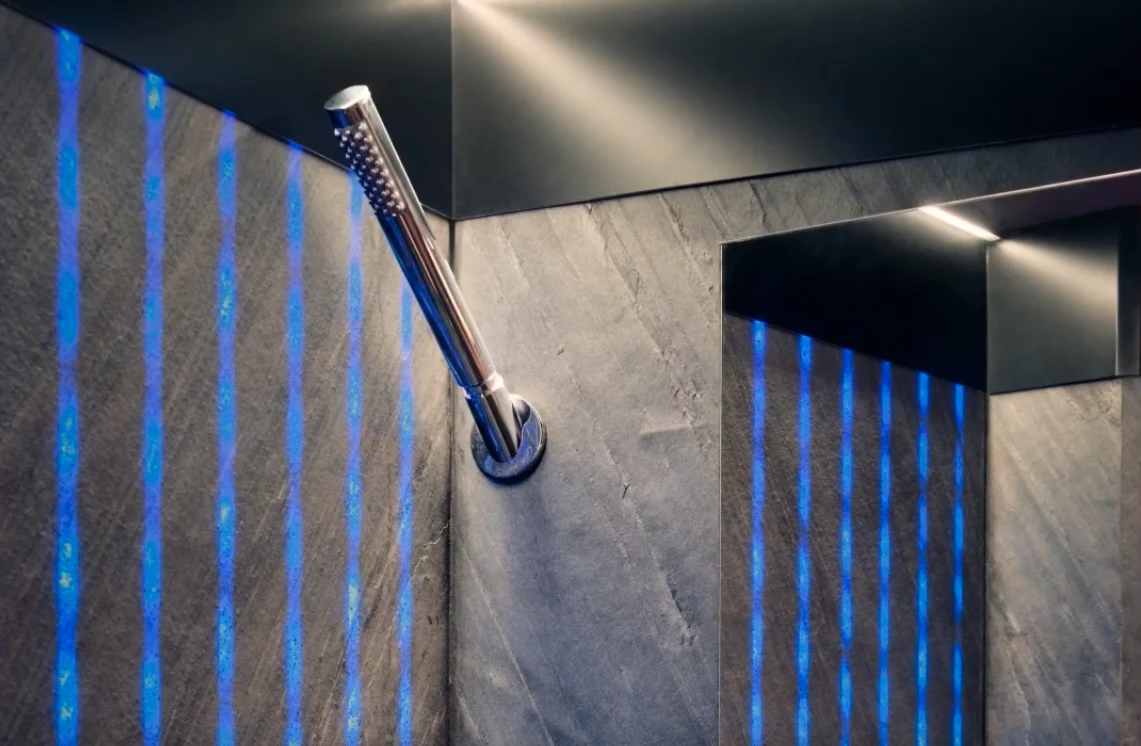
Instead, it leaves some empty space next to the bathroom for use as a rear gear locker accessed from an inside closet door and outside rear van door. We suppose some storage space is necessary, but the Vanyx locker feels half-cocked for any production camper, let alone one wearing a seven-figure price tag.
The van also includes a rear drying closet accessed from inside through the swing-out bathroom mirror or from outside via the driver-side rear door. It's meant for drying out ski jackets, wetsuits, rain boots and the like and also includes an outdoor shower sprayer for cleaning dirty gear.
The rainfall shower head is designed to conserve water to supply longer showers from the finite onboard fresh water reserves, trickling it out at a rate of 2.1 liters per minute, not even a quarter of the 9.5 liters a minute the EPA says the average US household shower dumps out.
From estimates and specs we've seen, RV shower heads aren't much more conservative, dropping down to around 6 L/min on the low end. So assuming it's not so slow as to be drafty and uncomfortable, Vanyx's low flow rate should prove a nice plus for those who like to spend a little more time in the shower.

Filling out the center of the Vanyx first floor, between the front dinette and rear spa bathroom, the L-shaped kitchen comes with an induction cooktop, large rectangular sink (also carbon fiber!) and 90-L compressor refrigerator.
The upstairs bedroom areas include starry headliners over the beds, delivering a grown-up version of the glow-in-the-dark ceiling stickers many of us might remember from childhood. The van's 18-speaker audio system includes dedicated bedroom speakers and under-bed subwoofers that provide a more immersive soundscape. Two side windows per bed and a roof hatch ensure that campers can adjust nighttime ventilation.
And the bed frames? Carbon fiber, once again.

Like its larger, heavy-duty truck-based expedition vehicle cousins, the Vanyx is designed to operate self-sufficiently while out in the rough. Along with the traditional fresh water tank, the van uses a recirculation system that recycles gray water into fresh using a multi-stage filtration process with UV.
A 1,200-Ah lithium battery bank delivers plenty of electrical power, drawing charge from the sun via an 800-W solar array. The gas-free setup eliminates LPG tanks and cylinders, relying on the MAN TGE's diesel tank to run the 6,000-W heating system, which can also run directly off the battery. The rig stays connected to the civilized world via a combination of LTE and satellite internet hardware.
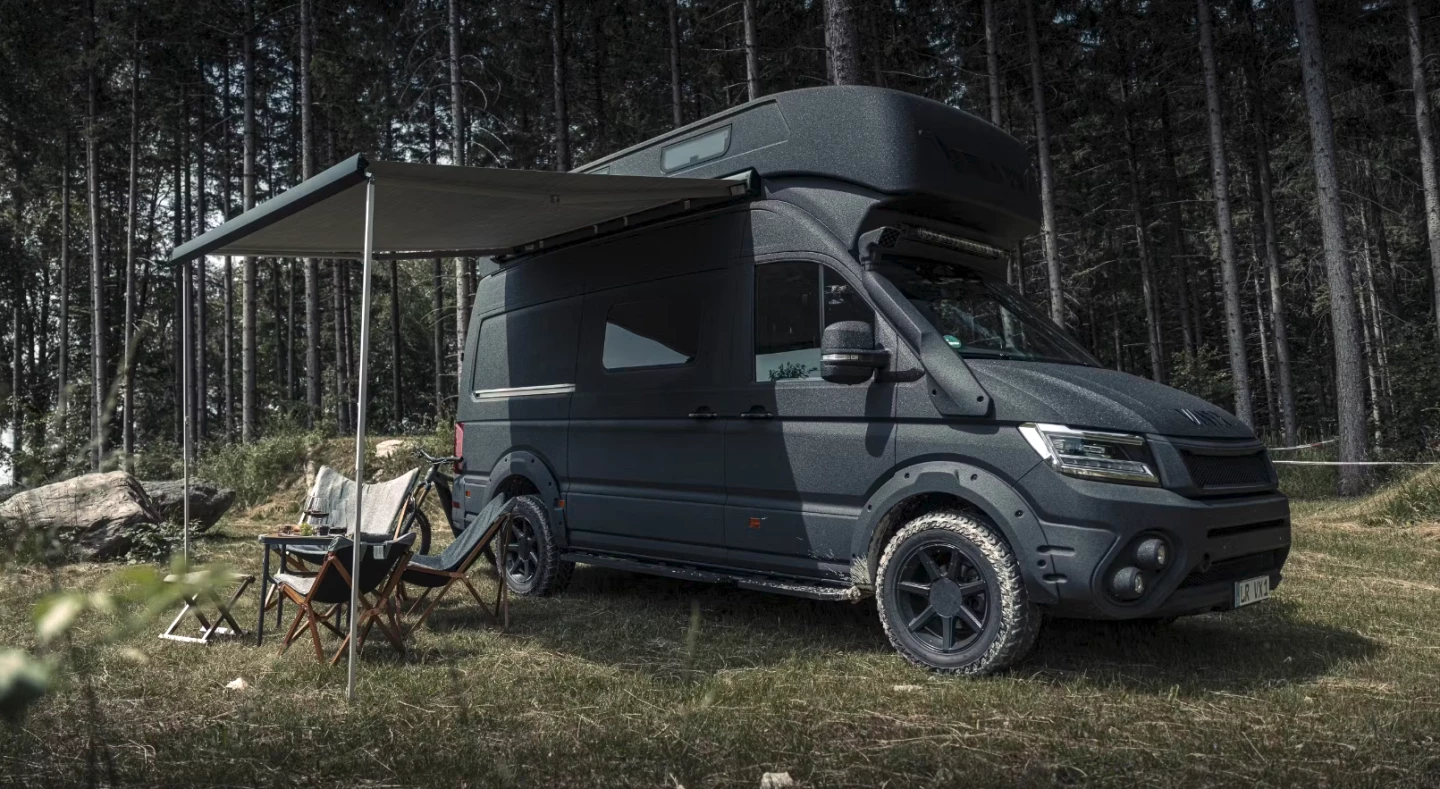
As you're likely well aware by now, the entire Vanyx exterior is finished with a Line-X protective coating. It's also dressed with a snorkel, front LED light bar and auxiliary bumper lights, electric outdoor awning, and 18-in forged alloy wheels with all-terrain tires.
A 360-degree camera system, interior air conditioning and underfloor heating round out the comprehensive features package.
By using the humbly-sized 599-cm TGE van and building with carbon fiber wherever possible, including for the under-floor heated/cooled battery and tank housings, Smart Adventure is able to keep gross vehicle weight down to 3,500 kg (7,716 lb), meaning the Vanyx camper can be driven legally with a basic Class B driver's license.
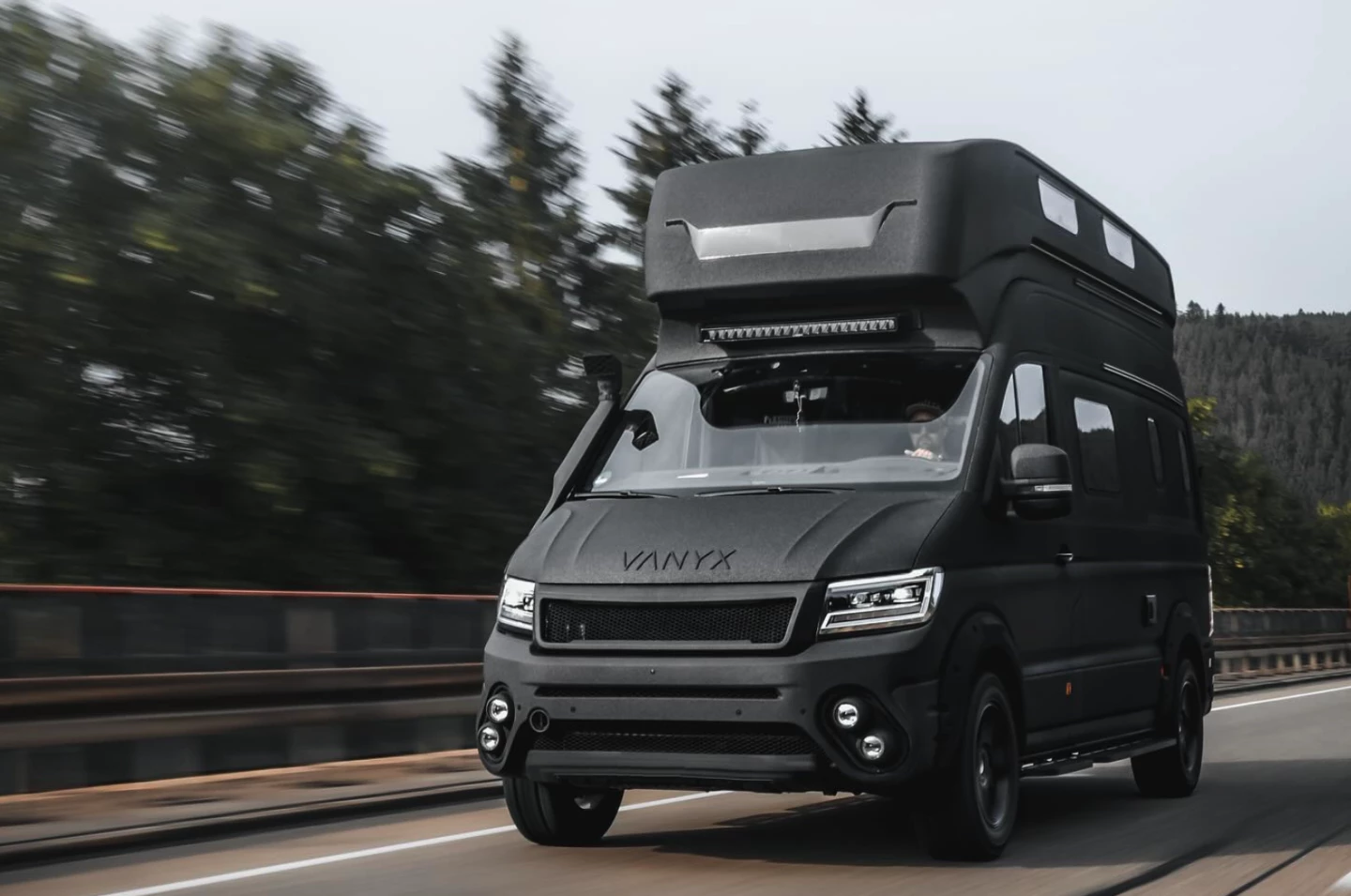
Some of Vanyx concepts, and the materials portfolio of real wood, stone, leather, carbon fiber and Alcantara, look like they belong in a $1 million camper van, but we're not sure they actually add up to an MSRP anywhere near that high. To that, Smart Adventure might respond that the base price for the "Luxury Edition" described is actually €890,000 (after VAT), and not a cent more. That converts to roughly $970,000 on this particular Thursday evening.
Touché?
Smart Adventure debuted the Vanyx earlier this year and plans to build just 99 examples of the full "Luxury Edition." German online marketplace Mobile.de is still advertising chassis #01, so it looks like the RV-buying public isn't much more excited than we are about a million-dollar camper van. Also being advertised is the simpler, lower-spec "Pure" base version that still manages an eye-watering price tag of €344,280 (US$375,250). We guess that's a steal compared to a $530,000 dual-level camper van?
The Vanyx goes through some off-road testing in the video below. For a closer look at the interior, RV YouTuber Alan Heath did a full walkthrough with the company at the van's debut.
Source: Vanyx





















